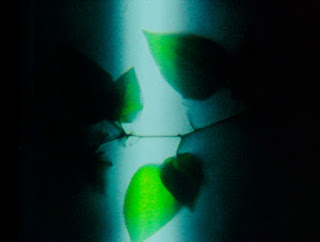Amsterdam director Leandro Listorti's new film stands as the lengthiest work in his oeuvre; while he's previously made a couple of longer form movies, including 2018's The Endless Film—which, despite its title, did actually conclude after less than an hour—Herbaria tops them all in terms of duration, even if it does clock in at a scant 83 minutes. Given that we've long since been in the age of the bloated running time, there's something refreshing about Listorti's approach of forgoing the filler in favour of simply saying what needs to be said. That said, at no point does Herbaria feel rushed or overly pragmatic; rather, it's a contemplative, somewhat ethereal essay film, one that makes its important points with grace and subtlety. Herbaria screens at the London Film Festival on Sunday—which marks the close of this year's edition—when it plays alongside Seaweed, an engaging short documentary on farming the marine vegetable of the title.
Both Seaweed and Herbaria are part of the festival's Experimenta strand, and as such rub shoulders with the likes of comic-fuelled collage The Blue Rose of Forgetfulness and James Benning's much-anticipated The United States of America. Over the years, I've found that Experimenta has thrown up some real discoveries—often at a point when festival fatigue is threatening to kick in—and it forms a fascinating part of the LFF programme. Moreover, some of the titles shown in Experimenta are quite rare; much to my chagrin, I still haven't tracked down a copy of a terrific film I saw in the section all the way back in 2013. Experimenta presents something very different from the narrative cinema that forms the bulk of the festival's offerings, which may well explain its appeal, and it's a strand that makes you feel compelled to take a chance on what it serves up; such practice is actively encouraged by the sale of the Experimenta pass, which entitles you to three screenings for a very reasonable £21.
Herbaria is wholly concerned with preservation, both filmic and botanical. While these two endeavours may seem disparate, Listorti is able to pull them together in a way that is as cohesive as it is surprising, with the overarching theme being the large-scale extinction of both plant species and movies. The film looks at ways in which such declines can be arrested, and early on an explicit connection is made between Herbaria's two areas of interest: film is susceptible to fungus attacks on account of the coating of gelatine it bears on its surface. It may surprise many to learn both that film contains gelatine (so yes, there is no such thing as vegan film), and that it—just like plant life—can be ruined by fungal problems; forget the threat that is vinegar syndrome for just a moment: in Herbaria, we witness alarming footage of fungi destroying an old reel of film, the unpreserved contents lost forever.
While it's far more likely that a film festival will attract many more cinephiles than botanists—and chances are that this majority will be more taken with the side of Herbaria that's explicitly concerned with cinema—the film's message regarding plant life is one that everyone would do well to listen to; since 1750, more than 500 species of plant have become extinct, and Listorti's film highlights the measures in place to ensure that yet more flora doesn't suffer the same fate. The efforts taken to preserve and catalogue all manner of vegetation, as evidenced here, are quite remarkable, with the dedication on show recalling another LFF 2022 title, the excellent Geographies of Solitude, in which naturalist and environmentalist Zoe Lucas logs virtually everything that grows (or is washed up) on a remote Canadian island. Like Geographies, Herbaria was shot on film, which lends an organic, tactile quality to this quietly impressive work.
Darren Arnold
Images: BFI





